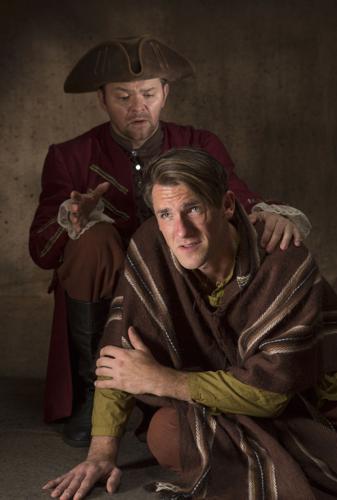Cynthia Meier feels the pressure.
Meier has adapted Thornton Wilder’s “The Bridge of San Luis Rey” for The Rogue Stage.
The Pulitzer Prize-winning 1927 novel is, to this day, much loved.
So there’s pressure there.
And, save for a theatrical production with puppets, it’s never been adapted for the stage.
More pressure.
Then there is this: Wilder’s nephew, Tappan Wilder, will be at the opening.
Yup, pressure.
“It was scary when I heard he wanted to come to see it,” says Meier. “I’m thrilled and honored that he wants to come, but it also makes me nervous.”
The story
Wilder’s book — at 138 pages, it’s more of a novella — is an intensely spiritual piece. Though a few of the characters are based on real people, the story sprang from the writer’s imagination, not from facts.
It takes place early in the 18th century in Peru. A rope bridge woven by the Incas collapses and five people plunge to their deaths. This is witnessed by a Franciscan monk, who becomes obsessed with why those five died. He is convinced their deaths are not accidents, that they are all part of God’s plan, and he is going to prove it. He spends six years compiling all the information about each that he can, from their births to their deaths.
His findings brand him a heretic and lead to his own death.
Thornton Wilder once said that the central question posed in the novel is this: “Is there a direction and meaning in lives beyond the individual’s own will?”
The author
Thornton Wilder was just 29 when he wrote the book. That was a little more than a decade before he wrote his Pulitzer Prize-winning play, “Our Town.”
“I can’t imagine the kind of wisdom he had at that age,” says Meier.
Tappan Wilder points to his uncle’s family as the reason for the deep reflection.
“They lived life by reflecting on the big issues, life, death and what it means,” he says. “They were brought up like that, starting with the great literature they loved.”
“The Bridge of San Luis Rey” was Wilder’s second novel, and expectations were not great, says Tappan Wilder, the literary executor of his late uncle’s estate.
“It was published by a company who expected it would appeal to an upscale, sophisticated readership,” he says, speaking by phone from his San Francisco home. “He (Thornton Wilder) did not think it would be a popular book, but it would make enough to cover costs. In the first month, it went through nearly 20 reprints; it was a literary explosion.”
The permission
About two years ago, Meier contacted the Wilder estate hoping to get an OK to write a stage version of the novel. Tappan Wilder had the final say on adaptations. He called her back.
“He said, ‘Why do you want to do this?’ And I said, ‘because I love the novel’, ” says Meier. “I love all the expressions of love. The descriptions of the different kinds of love, and everybody is seeking some connection, some love.”
Meier isn’t the first to try an adaptation, says Wilder.
“People have found it a difficult play to adapt. X, Y and Z have tried it, and it hasn’t come off. But I say, let 1,000 flowers bloom.”
Then Meier got the contract from the Wilder foundation.
“There were all these scary elements, and they had rights to change things,” says Meier. “Right before I turned the script in, I thought, ‘Oh my God, what if they don’t like it?’ ”
She needn’t have worried.
Wilder didn’t even read it.
“I don’t want to read it,” he says. “I want to see it.”
The adaptation
“The biggest challenge was how much narrative there is,” says Meier. “We wanted to keep a lot of it because that’s where the poetry and philosophy is. But how do you make that not boring or repetitive on stage?”
Wilder saw another challenge.
“In the novel, you have these extraordinary portraits of people,” he says. “How do you draw a kind of dramatic arc? That’s the challenge of anybody adapting it.”
And in the end
The real message of “The Bridge of San Luis Rey” is the importance of love, says Meier.
“Not romantic love, not passionate love, but that real, enduring, First Corinthians love.”
Meier quotes the last line of the novel: “There is a land of the living and a land of the dead and the bridge is love, the only survival, the only meaning.’ ”
“I think one of the things Wilder is saying,” says Meier, “is let’s look at how we are living our lives and forget about all those other things we’re chasing. Just look at one another and love one another.”






